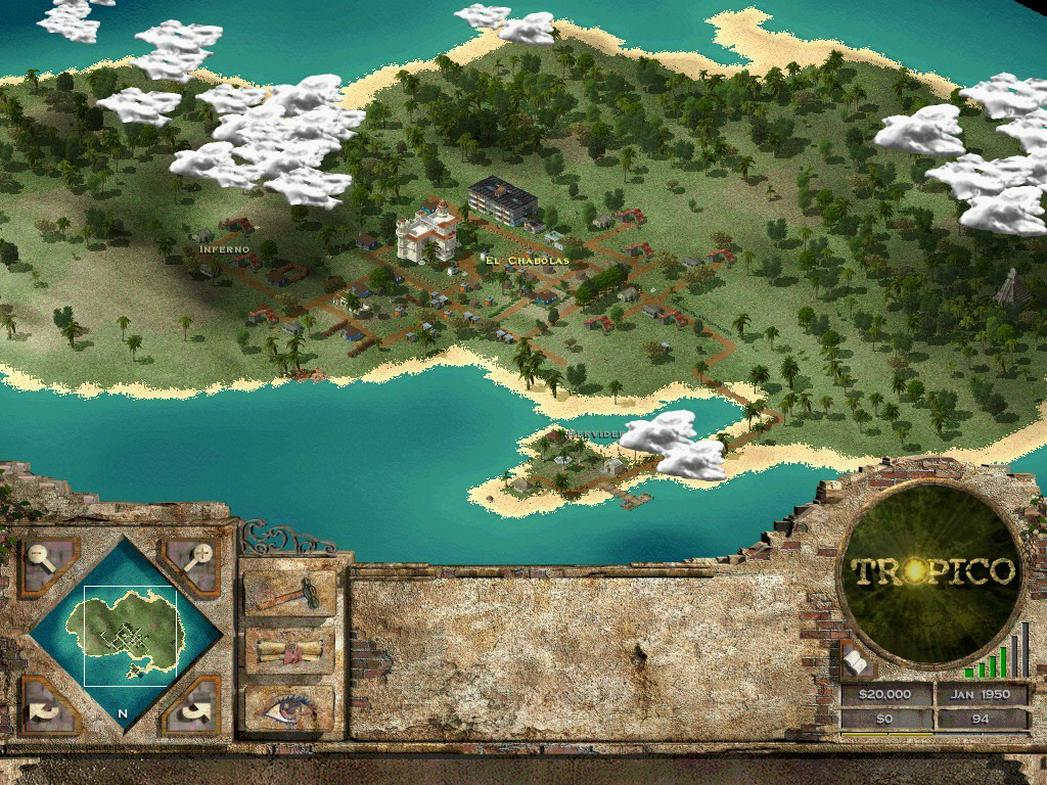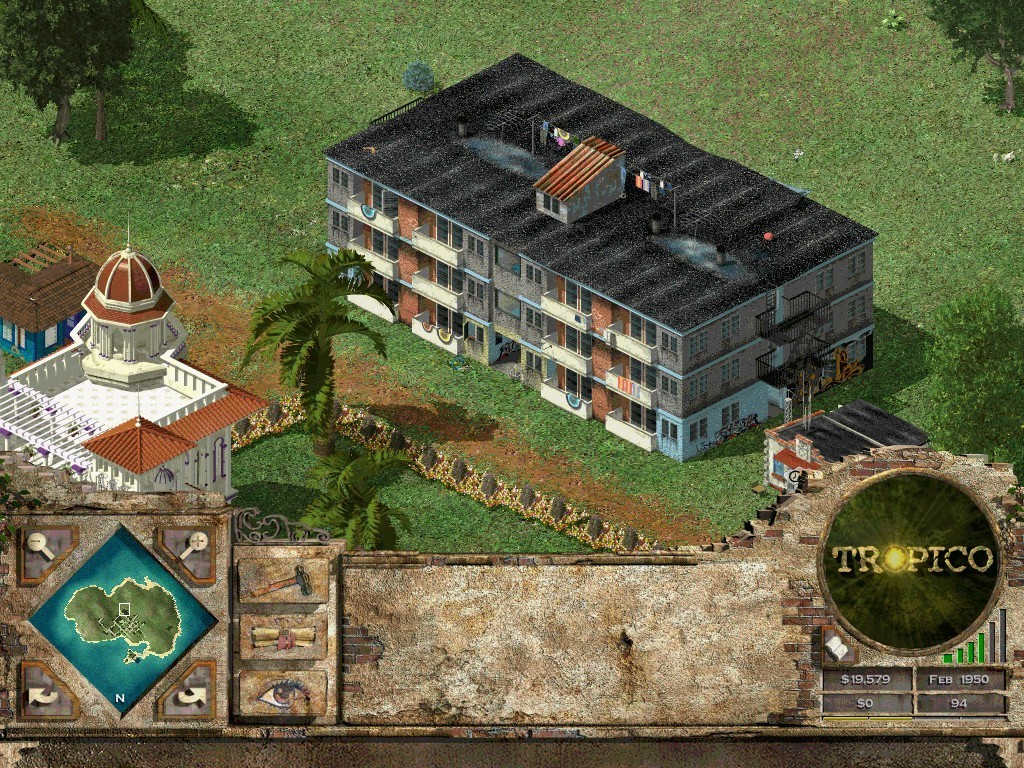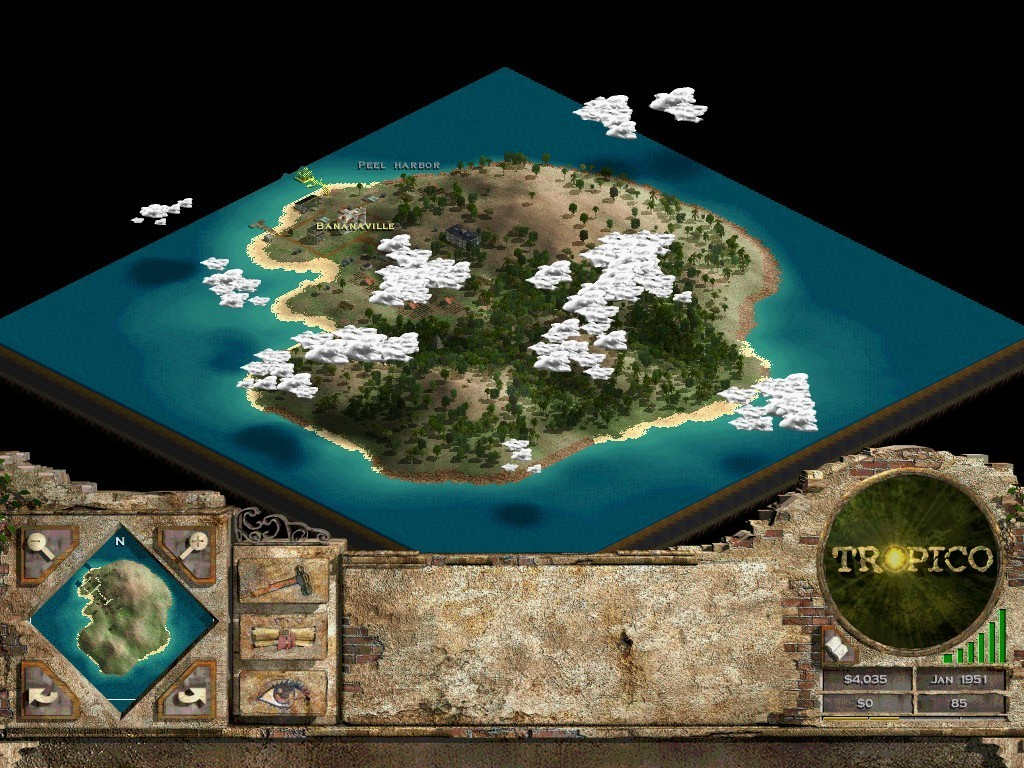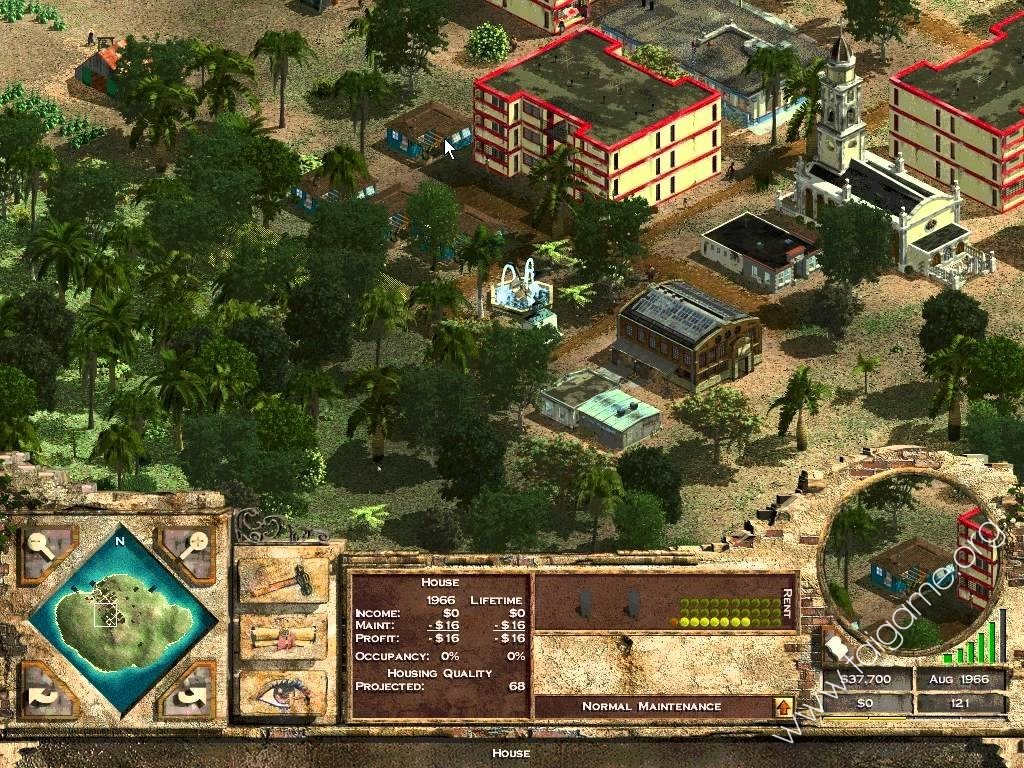
Tropico is a city-building simulation game that has captured the imagination of gamers worldwide since its initial release in 2001. Developed by PopTop Software and published by Gathering of Developers, the game follows the life and times of ‘El Presidente’, who is tasked with building and managing his own island nation called Tropico. With a compelling storyline, intricate gameplay mechanics, and stunning visuals, Tropico has become an industry-standard for city-building simulation games over the years.
The game’s premise revolves around players assuming control as El Presidente – a character modeled after infamous real-world dictators such as Fidel Castro or Augusto Pinochet – to build their own tropical paradise from scratch. The players must manage various aspects of their fledgling state such as resources, finances, infrastructure development, diplomacy with foreign nations while keeping their people happy all at once.
Throughout the game’s history spanning several sequels and spin-offs; it has retained its popularity among gamers worldwide due to its unique gameplay mechanics. Players can choose different play styles ranging from benevolent rulers who seek to improve the lives of their citizens through social programs like education or healthcare to iron-fisted oppressors who maintain order strictly through military rule or police states.
In this article, we will delve deep into exploring Tropico’s rich history spanning two decades since its inception in 2001. From understanding how it influenced other games of similar genre to discussing some common strategies employed by seasoned players – our goal would be to provide a comprehensive guide on everything related to this iconic video-game franchise. So let us embark on this journey together!
- Understanding the Historical Context and Cultural Significance of Tropico as a Video Game
- Examining the Gameplay Mechanics and Strategy Elements in Tropico for Maximum Efficiency
- The Role of Political Science in Developing and Portraying Political Systems in Tropico
- A Comprehensive Guide to Building and Managing Your Own Island Nation in Tropico
- Analyzing the Economic Structures, Resource Management, and Infrastructure Development in Tropico’s Virtual Worlds
Understanding the Historical Context and Cultural Significance of Tropico as a Video Game
The premise of the game is to build and manage your own island nation, complete with its own economy, political system and infrastructure. This unique blend of strategy and city-building mechanics created a new genre for gaming enthusiasts to enjoy.
The historical context of Tropico can be traced back to the era of colonialism in the Caribbean region. During this time period, several European nations such as Spain, France and Britain colonized various islands throughout the Caribbean sea. These colonies were often run by dictators or military leaders who exploited their power for personal gain at the expense of their subjects. In Tropico’s gameplay mechanics, players must balance economics with politics while preserving national pride through various social programs such as healthcare initiatives or educational reform policies.
Furthermore, Tropico holds cultural significance as it highlights many important issues that are relevant even today. For example, gender roles are explored through female citizens being paid less than male ones despite having equal qualifications; racial discrimination is addressed due to different races not having equal opportunities for promotion within government positions; class inequality is debated due to differing levels of wealth distribution between classes on one’s island nation.
Overall, Tropico stands out among other video games because its attention to detail allows players to experience aspects of historical context while still enjoying a fun gameplay experience. Its commentary on both past events and current societal issues makes it an important cultural artifact worth exploring further from both academic and gaming perspectives alike.
Examining the Gameplay Mechanics and Strategy Elements in Tropico for Maximum Efficiency
To achieve maximum efficiency in Tropico, players need to understand the gameplay mechanics and strategy elements. One of the critical factors for achieving success in Tropico is balancing income and expenditure.
The first step towards maximizing efficiency in Tropico is understanding the different resources available on the island, such as food, power, housing, healthcare facilities, and entertainment services. Players need to allocate resources efficiently based on population needs while ensuring sustainable growth of their economy.
Another important factor that influences gameplay mechanics in Tropico is political management. As a leader of your nation-state, it’s essential to maintain good relations with foreign countries while delivering socio-economic objectives for your people. Thus, creating policies that address unemployment rates or poverty levels can improve public opinion by providing citizens with jobs or better living standards.
In conclusion, mastering gameplay mechanics and strategy elements are crucial steps towards achieving maximum efficiency in Tropico. By focusing on resource allocation strategies related to income generation and expenditure management while maintaining positive political relationships with foreign allies will enable players to succeed at this exciting simulation game!
The Role of Political Science in Developing and Portraying Political Systems in Tropico
The game is designed to simulate the complexities of politics, economics, and social policies within a fictionalized world.
In Tropico, players are given the power to make decisions on various aspects of governing their nation. These include setting tax rates, building infrastructure such as roads and hospitals, creating laws that affect citizens’ freedom or restrict them from doing certain activities. Political scientists can contribute to the development of these decision-making mechanisms by providing insights into how real-world governments function.
Moreover, political science helps shape the portrayal of political systems in Tropico by reflecting different ideologies such as democracy or authoritarianism through gameplay mechanics. For instance, democratic nations will have more emphasis on citizen satisfaction while authoritarian ones prioritize control over citizens’ actions.
Overall, incorporating insights from political science not only improves realism in games like Tropico but also provides an opportunity for players to learn about different forms of governance and their implications beyond their virtual worlds.

A Comprehensive Guide to Building and Managing Your Own Island Nation in Tropico
First, you need to select a suitable map that meets the requirements of your chosen victory condition. Then, start by constructing basic infrastructure such as roads, power plants, water facilities, and housing units to accommodate your citizens.
As you progress with the game, it’s critical to maintain a balanced economy by investing in industries and tourism while ensuring that taxes are not too high for citizens or investors. Additionally, diplomatic relations with other nations must be maintained to secure trade agreements and negotiate potential threats from pirate attacks or military invasions.
To build a self-sustaining community on Tropico Island requires prioritization of food production while paying attention to factors such as education levels and healthcare systems. It’s usually helpful to diversify crop cultivation so that income is derived from multiple sources rather than depending solely on one particular product.
Finally, keeping up with technological advancements is essential for success in Tropico’s competitive world environment. Upgrading transportation networks like airports or harbors can help increase tourism revenues by attracting more visitors each year!
Overall building & managing an island nation may seem daunting at first but following these guidelines will ensure sustainable growth towards achieving prosperity!
Analyzing the Economic Structures, Resource Management, and Infrastructure Development in Tropico’s Virtual Worlds

Tropico is a city-building and management game that allows players to create their own Caribbean island nation from scratch. The game features various gameplay mechanics such as resource gathering, trade, political decision-making, and construction of buildings.

In terms of economic structures, Tropico offers players plenty of options to manage their nation’s economy. They can choose between different types of industries such as tourism, agriculture, mining or manufacturing. Each industry has its own set of advantages and disadvantages which need to be carefully considered when deciding on the type of economy you want to build.
Resource management is also an important aspect in Tropico’s virtual world. Players must ensure they have enough resources like food, water or electricity for their citizens while maintaining a healthy balance between income and expenses. Additionally, natural disasters may occur at any time which will require quick thinking and decisive action to prevent widespread damage.
Infrastructure development plays a crucial role in creating successful cities in Tropico’s virtual world. To thrive economically players must invest heavily into transportation systems like airports or ports to facilitate trade with other nations; likewise education centers are necessary for improving citizen productivity levels over time.
In conclusion analyzing the economic structures ,resource management ,and infrastructure development in tropics’ virtual worlds requires careful consideration and planning .Players who delve deep into understanding these systems will undoubtedly succeed within this engaging simulation that encourages strategy building skills within an entertaining environment .
In conclusion, Tropico is a captivating and immersive game that has successfully managed to blend elements of city-building, management simulation, and political strategy into one cohesive package. From its detailed graphics and realistic sound effects to its intricate gameplay mechanics and challenging scenarios, the game offers players an unparalleled level of depth and complexity.
The ability to customize your own island nation in Tropico creates endless possibilities for unique gameplay experiences. The political system in the game also adds another layer of complexity as it requires players to balance their personal ambitions with the needs of their citizens while navigating various factions within society.
Overall, Tropico is a must-play for any fans of strategy or simulation games looking for a new challenge. Whether you’re managing resources during a natural disaster or negotiating with superpowers on behalf of your people, every decision made will have lasting consequences that shape both your country’s future and reputation. With its addictive gameplay loop, rewarding progression system, robust modding community, and impressive attention-to-detail –Tropico stands tall amongst other titles in the genre.
Read More:- Conquer the World: Play Europa Universalis III and Rule as a Mighty Empire! (69 characters).
- Rise of Nations: Thrones & Patriots – Master the Art of War and Dominate Empires in this Epic Game!.
- Experience Life-Changing Surgeries with LifeSigns: Surgical Unit Game – A Medical Masterpiece!.
- Experience History in Game Form: Making History – The Calm and the Storm.
- Discover the Best Strategies for Dawn of Discovery and Rule Your Empire! (70 characters exactly).
- Conquer Ancient Rome with Europa Universalis: Rome – Vae Victis Expansion Pack! (68 characters).
- Unravel the Mystery: The Curse of Monkey Island Game Review and Analysis.